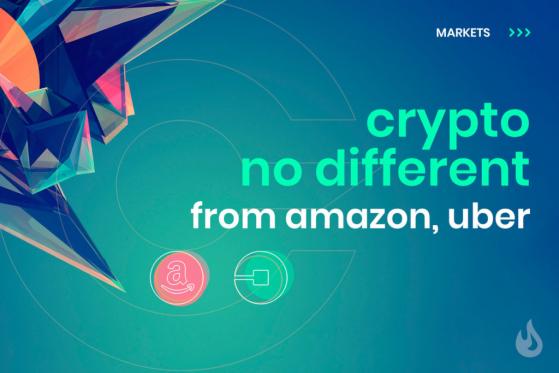- Cryptocurrencies have been likened to disruptive tech startups like Uber (NYSE:UBER) and Amazon (NASDAQ:AMZN).
- Cryptocurrencies are a low-cost model that can be rapidly scaled to aid developing countries of the world, says Vijay Ayyar.
- India’s government has been urged to regulate cryptocurrencies instead of imposing an outright ban.
Bitcoin and blockchain are mutually inclusive, and the real innovation comes from how they can work together.
India is at a crossroads amid a heated debate over whether the government should ban or merely regulate cryptocurrencies.
Presently, the Indian government is considering a law that would outlaw the use of all private cryptocurrencies in the country and establish a framework for the Reserve Bank of India (the central bank) to launch and regulate its own digital currency.
Cryptocurrency experts believe that cryptos are revolutionary technology just like Amazon and Uber, which are low-cost models that can be scaled globally.
Advocates Make a Strong Case for Cryptos in India
The Indian government’s latest attempt to crack down on cryptos is sure to have severe repercussions for the country’s digital currency industry.
This is not the first time the government has set its sights on cryptocurrencies. In 2018, RBI banned banks and other financial institutions from processing transactions linked to cryptocurrencies.
However, the Indian Supreme Court later lifted the ban in 2020, and the country’s nascent cryptocurrency industry continued to thrive. That progress would come to a quick halt with the passage of this bill.
Vijay Ayyar, head of Asia Pacific at top cryptocurrency exchange Luno, highlighted the importance of the decentralized nature of cryptos as a potential benefit in the Indian economy.
He said:
Take any of our centralized services that have a global presence such as Uber or Amazon. These are potentially middlemen. Cryptos are no different. They will create a decentralized way of delivering the services that will get developed around it. It's a long-term view, but we are moving towards it. Cryptocurrencies are like decentralized Amazon and Uber services.
He also believes that cryptocurrencies can be a great revenue stream for the government and argues that instead of an outright ban, authorities should explore smart regulation. “This could well be a revenue-generating source for the Indian government. There are good indications that crypto is becoming the next big thing in the internet revolution the world over. Big institutions are looking at crypto. Major countries are regulating it, not banning it. India should take the same road,” Ayyar argues.
On the Flipside
- The Central Bank of Nigeria recently ordered local banks to stop processing crypto transactions.
- The country’s Securities and Exchange Commission (SEC) qualified cryptocurrencies as a legitimate asset class last year.
- Belarus is set to become a major cryptocurrency hub in the world after its government recognized the legality of Cryptos with the passage of the Digital Economy, effective in March 2018, provides the legal framework for cryptocurrencies and blockchain technologies.
Can Bitcoin Exist Without the Blockchain?
India’s government believes that while blockchain technology is intrinsically good, cryptocurrencies are bad. Cryptocurrency advocates like Vijay Ayyar believe that the two concepts are “mutually inclusive and complement each other.”
He notes, “You can build a blockchain with or without a cryptocurrency, but it might just end up like any random database that you can build with 10 computers.” Ayya believes the real innovation will come from having both a blockchain and cryptocurrency deployed in India at scale around a public network, “something like a blockchain with an associated crypto-economic system that helps you manage the demand and supply of the resource that the network will be providing,” Ayyar continues.
